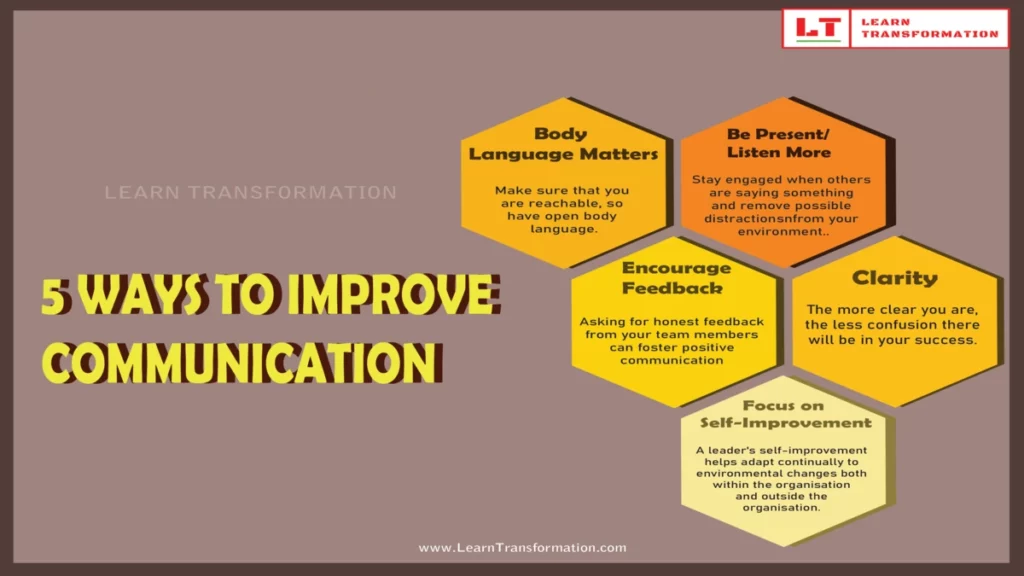Leaders face many obstacles when it comes to a soft skill i.e. effective communication. One of the abilities of a good leader is communication skills. Communication skills topped the fundamental skills needed to succeed in the workplace. With the rise of social media, communication is becoming more casual, even in situations where more formal ways of communication are required. Good leaders prioritized communication, both with the customers and within the organisation.
Communication skills is the key to solving problems and keeping loyal customers and employees. This is a soft skill that connects a leader better with their team members.
Check it out – Best Communication Skills to be a Good Leader
A good leader is a good communicator! 5 ways you can improve your communication skills

Good communication skills is one of the main abilities of a leader. As a leader, you must be an effective communicator in countless relationships at the organizational level to achieve results. Leaders must be purposeful and deliberate about effective communication. You must know when and how to communicate.
1. Body language matters the most in communication skills
Body language is very important for face-to-face and video conferencing. Make sure that you are reachable, so have open body language. Positive body language like eye contact, nodding and other relaxed gestures can inspire other team members and make them comfortable communicating with you. Keep eye contact so that the other person knows you are paying attention to their saying. So to be an effective communicator not only think about words but also about your attitude and actions as they impact your team members in various ways.
2. Be Present/Listen more
Whenever you are communicating either in-person or virtual, people can easily tell if you are absent. Stay engaged when others are saying something and remove possible distractions from your environment. People notice everything like if you are checking your phone while talking to them and unlike they will also not pay attention when it’s their turn. Keep the focus on your employees and team members what they are saying.
Leader’s Tip
Engage in active listening by paying close attention, asking questions to clarify, and showing empathy for others.
3. Encourage Feedback
Asking for honest feedback from your team members can foster positive communication and it will help to build trust between you and the organisation. This will also make your team feel more respected and give them a chance to hear their voices. If you will take their feedback seriously you will be able to grow as a leader and enhance your skills. If you are going to take feedback and don’t implement them, they are going to lose their faith in your abilities to follow through.
Check out this video:
4. Clarity
Speak specifically when communicating with the employees. Tell them clearly about what you want to see, the desired result of the project and the initiative to achieve by the end of every milestone. The more clear you are, the less confusion there will be in your success. Employees will know what they are working towards and will feel more engaged in the process. By speaking clearly about the organisation’s vision and goals, leaders maintain a better relationship and trust amongst their team and break down the communication barrier.
Leader’s Tip
Use plain language, arrange your thoughts logically, and modify your delivery to fit your audience to perfect the art of clear and succinct messaging.
5.Focus on self-improvement
Self-improvement is important for leaders so they can involve in their leadership development and build a stronger culture. When leaders focus on self-improvement this also helps with contributing a clear vision for the team. A leader’s self-improvement helps them to adapt continually to environmental changes both within the organisation and outside the organisation.
“Communication is your ticket to success if you pay attention and learn to do it effectively.” —- Theo Gold
FAQs
What happens if there is poor communication in the workplace?
Ineffective communication may lead to confusion and distrust between leaders and employees. This may cause employees to make wrong assumptions about the work. Poor communication does not only harm the organisation but also the future chance.
What is the best way to improve communication skills?
Whenever you are communicating either in-person or virtual, people can easily tell if you are absent. Stay engaged when others are saying something and remove possible distractions from your environment. People notice everything like if you are checking your phone while talking to them and unlike they will also not pay attention when it’s their turn. Keep the focus on your employees and team members what they are saying.
Key Takeaways
- Effective problem-solving, stronger relationships, and a deeper understanding all result from attentive listening.
- Effective and direct communication helps eliminate confusion, boosts efficiency, and fosters confidence.
- Practise, self-awareness, and a willingness to adjust and learn from feedback are essential for developing better communication abilities.

